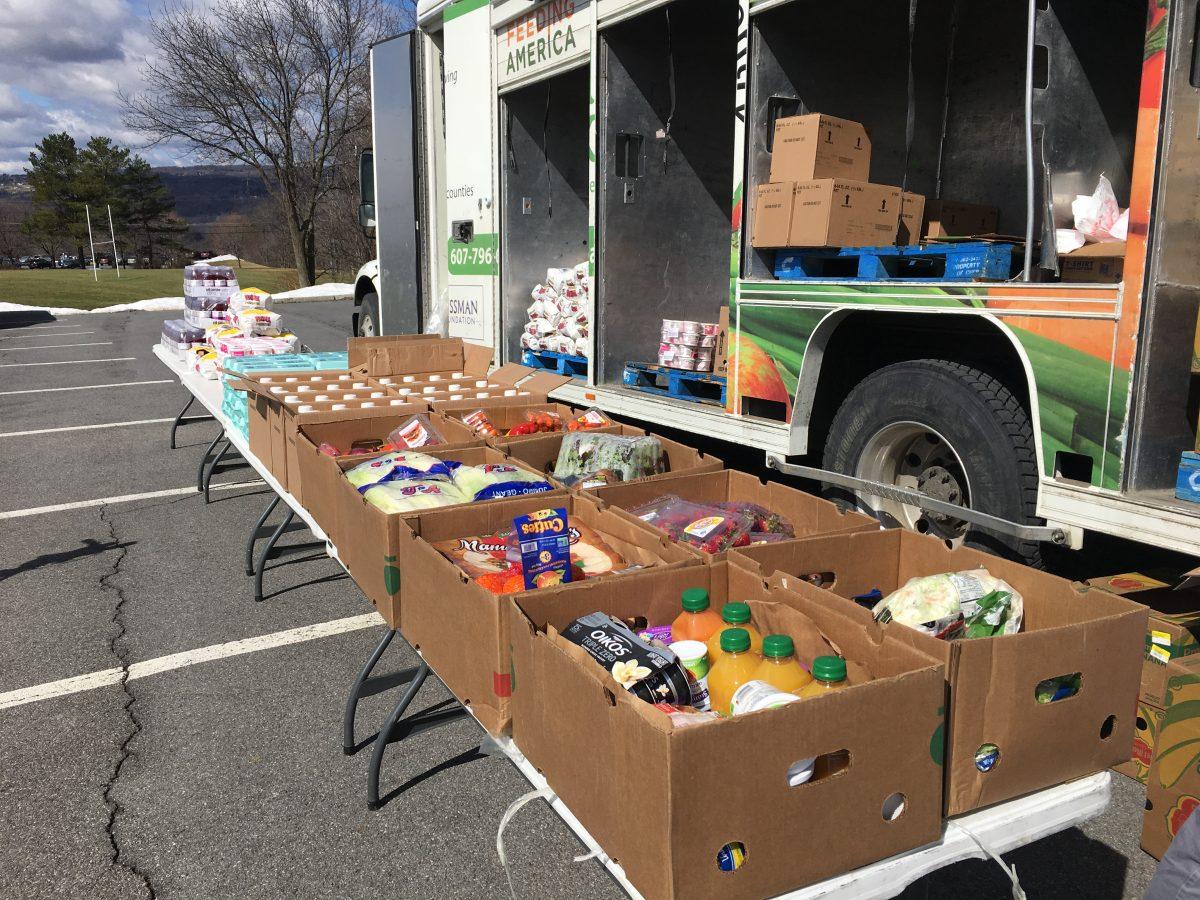ITHACA-
Food security is problematic on college campuses across the country today. In order to help combat this issue a Mobile Food Pantry came to the Ithaca College campus on March 29 for the first of a series of three visits.

The food pantry uses an old bulk beverage truck that has been converted into a means to deliver fresh produce and other grocery products to people in need. It is part of The Food Bank of the Southern Tier, which was established in 1981 in Elmira, New York. Their mission is to provide easily accessible and affordable food to people across the six counties of Broome, Chemung, Schuyler, Steuben, Tioga, and Tompkins, covering 4,000 square miles.

On the day of the event, the pantry was situated in parking lot N on Ithaca College’s campus from noon to one in the Afternoon. The program was facilitated by 12 volunteers ranging from students to campus police officers to members of the college administration. Their job was to assist in unloading and distributing the food to members of the college community.
According to their website, the Mobile Food Pantry gave out 3,700,000 pounds of food to people in need within the past year. Mark Lisi, the mobile food pantry manager at the Food Bank of the Southern Tier, said that the Mobile Food Pantry covers six counties with 80 distribution sites.
“We found out that there’s a lot of food insecurity on all college campuses and we just recently became a partnership with Ithaca College in order to bring our mobile food pantry here,” Lisi said. “We started this this year and we’ve gone to every campus in our six county regions.”
Amanda Lippincott, Chief of Staff at Ithaca College, volunteered at the Ithaca College Mobile Food Pantry by unloading potatoes from the truck and handing out food to students and faculty. She has been working with food banks across the United States for 15 years, but this was her first opportunity to volunteer for the Food Bank of the Southern Tier, she said.
“There is a real cost of food, which is difficult, including the cost to get it,” Lippincott said. “It’s not always as convenient as we think and it’s not always price savvy, so to see this happening makes me so happy.”

The Commission on Independent Colleges and Universities (CICU) has been trying to work with New York senators to increase the amount of opportunities for affordable or free food for college students, Lippincott said.
The pantry visits last one to two hours and currently provides 200 to 250 families with nutritious food to help them make ends meet. The Food Bank of the Southern Tier partners with local sponsor organizations who provide funds and volunteers so that the Mobile Food Pantry can be brought to a pre-designated site.
Most of the food at the mobile pantries are donated by community members, with some foods like eggs and orange juice paid for through federal funding. The food delivered to the Ithaca College campus included cottage cheese, potatoes, juice, yogurt and cereal, canned goods, frozen meals and fresh fruit. Many students who arrived did not have transportation to deliver their food back to their dorms or apartments, so volunteers drove students and their food back to their residences.

Hannah Garrison, a junior at Ithaca College, said that she found the food pantry helpful for students who do not have the accessibility to grocery stores and for staff who may not have the funds to buy food each week.
“I think it’s really great that the food drive is on campus,” Garrison said. “A lot has been going on with the faculty and their strikes and a lot of staff are on food stamps, so this is a good opportunity for them to get what they need and for anyone else in the IC community to come.”
The Mobile Food Pantry will be coming back to the Ithaca College campus on April 7 and May 3. Though the pantry is meant for members of the college community, on these dates anyone from the Ithaca community is more than welcome to take advantage of the easy accessibility to free and healthy food, Lisi said.













